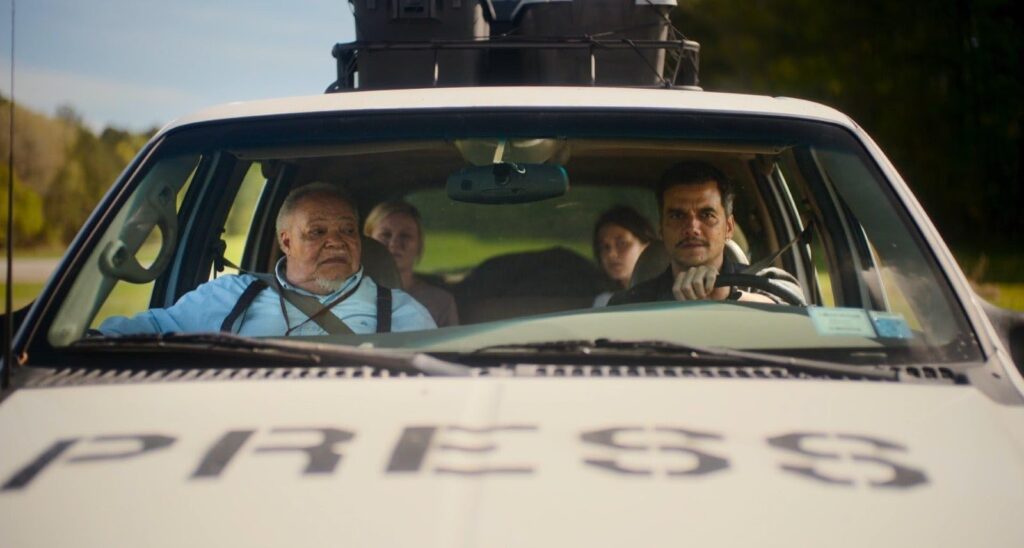· Tara Price · Lifestyle
Alex Garland’s Civil War Movie: A Powerful Exploration of America’s Descent
![<p>Alex Garland’s latest film, the thought-provoking anti-war film Civil War, made its debut at the prestigious SXSW Film Festival in 2024. Distributed by A24, the movie is slated for a wide theatrical release on April 12th. Set against the grim backdrop of a ravaged America torn apart by civil conflict, Civil War follows journalists Lee […]</p>](/_image?href=https%3A%2F%2Fneonmusic.online%2Fwp-content%2Fuploads%2F2024%2F03%2FMV5BYTI4ZTQyMzItYWNhZS00MmEwLWEwYWYtYWQyZDNiNWQxNTRjXkEyXkFqcGdeQXVyMTUzMTg2ODkz._V1_FMjpg_UX2160_.jpg&w=900&h=506&f=webp)
Alex Garland’s latest film, the thought-provoking anti-war film Civil War, made its debut at the prestigious SXSW Film Festival in 2024. Distributed by A24, the movie is slated for a wide theatrical release on April 12th. Set against the grim backdrop of a ravaged America torn apart by civil conflict, Civil War follows journalists Lee (Kirsten Dunst) and Jesse (Cailee Spaeny) as they navigate war-torn cities, offering a haunting exploration of the impact of war on society and the essence of journalism amidst chaos.
This ambitious cinematic endeavour stands as Garland’s potent response to America’s internal strife, while also representing A24’s most significant project to date. Through the lenses of veteran photojournalist Lee and the inexperienced Jessie, joined by the talented Wagner Moura, the film sheds light on societal anxieties with an unflinching documentary-style approach, highlighting the fundamental role of journalists in preserving democracy during times of turmoil.
The Premise: A Dystopian Exploration of Division
Civil War is set in a near-future America where a deadly civil war has torn the nation apart. The government resorts to airstrikes on its own soil as the Western Forces inch closer to Washington, D.C. The film depicts a dystopian drama unfolding in a militarised New York City, where an atmosphere of “us versus them” permeates every corner. The American military has triumphed over the secessionist states of California and Texas, with the president authorising drone strikes against civilians and disbanding the FBI.

At the heart of the story are journalists Lee, Joel (Wagner Moura), Jessie, and Sammy (Stephen McKinley Henderson), whose mission is to secure the last interview with the president amidst the chaos of war. The narrative delves into the horrors of conflict, the trauma it inflicts, and the extreme lengths journalists go to in order to uncover and document the truth, highlighting the film’s focus on the psychological toll of war and the critical role of journalism.
Garland’s Artistic Vision: Speculative Fiction and Psychological Impact
Civil War marks a departure from Alex Garland’s previous sci-fi and horror works, venturing into the realm of speculative fiction that explores the psychological impact of war without resorting to the cliché of left-versus-right ideology. This approach lends the conflict a more human and unpredictable quality, setting it apart from conventional narratives.
While sharing structural and thematic similarities with Alex Garland’s acclaimed Children of Men, Civil War presents a less ruthlessly authentic depiction of America’s descent into turmoil. The film emphasises the importance of journalism and critiques the public’s interaction with information amidst a vulnerable nation’s downfall, offering a powerful commentary on the role of media in times of crisis.
Behind the Scenes: A Collaborative Triumph
The making of Civil War represents a significant milestone in Alex Garland’s creative journey, with his collaboration with the esteemed A24 studio. The production team, led by Andrew McDonald and Alan Reid from DNA, alongside Gregori Goodman, brings a wealth of experience to the table. DNA’s previous successful partnership with Garland on Ex Machina has been pivotal in realising his unique cinematic vision, while Goodman’s diverse producing credits, including Three Kings and Captain Phillips, promise a rich storytelling tapestry.
In a bold move, Garland opted to shoot Civil War with the cutting-edge DJI Ronin 4D camera, driven by his admiration for its revolutionary capabilities. He praised the camera as “a beautiful tool” that offers affordability and unparalleled freedom during filming, underscoring his commitment to innovative filmmaking and delivering a visually stunning narrative that aligns with fans’ expectations of his work.
The film boasts a star-studded cast, including Kirsten Dunst and Wagner Moura, enhancing its appeal. Initially slated for an April 26, 2024, release, the film’s premiere was moved up two weeks, highlighting A24’s confidence in its potential success. Civil War represents A24’s largest budget production to date, indicating the scale and ambition behind this project. The movie is expected to have an exclusive theatrical run before potentially streaming on Max, offering audiences various ways to experience Garland’s latest masterpiece.
The Psychological Impact of Warfare
Civil War delves into the profound psychological repercussions of warfare, a topic that extends far beyond the battlefield, inflicting deep-seated trauma on individuals and communities. Numerous studies and observations across different war-torn regions have shed light on the overwhelming mental health impacts of conflict.
According to research, a staggering 28.9% of individuals in war-afflicted areas suffer from depression, 30.7% from anxiety, and 23.5% from PTSD. Civilians bear a heavier burden, with a higher prevalence of depression (34.7%) and anxiety (38.6%) compared to military personnel. The mental health impact is more severe during active wars, with depression and anxiety rates reaching 38.7% and 43.4%, respectively.
Children and refugees are among the most vulnerable, with studies revealing high levels of post-traumatic symptoms and grief among children in the Balkans and Sudanese children in refugee camps showing higher rates of individual psychopathology than the general population. A study among Kurdish families in camps found a staggering 87% of children and 60% of caregivers suffering from PTSD, highlighting the pervasive psychological toll on displaced populations.
The long-term psychological consequences of warfare are equally devastating. A longitudinal study found PTSD still highly prevalent among Cambodian young people three years after initial trauma exposure, while a study in Lebanon found 42.1% of former hostages of war suffering from psychological distress years after their captivity. The continuous exposure to conflict, as seen in Lebanon and the Palestinian territories, perpetuates a cycle of mental health issues, including severe depression and PTSD among survivors.
These findings underscore the catastrophic impact of warfare on mental health, urging a global response to address the psychological needs of those affected by conflict.
Reception and Cultural Impact
Civil War has ignited intense discussions online, stirring controversy with concerns over its potential interpretation as glorifying or serving as a role model for extremist groups. Audience reactions have been polarized, showcasing a split where some hail it as a masterful cinematic experience while others are discomforted by its proximity to the current political unrest.
Critical reception has been mixed, with IndieWire assigning the film a ‘B’ grade, acknowledging its potent depiction of war and the ethical quandaries of journalism, while also critiquing the clarity of its message. Praise has been directed towards Kirsten Dunst’s remarkable performance, though critiques have emerged regarding the film’s general focus and its portrayal of American society.
Amidst the mixed reactions, the film’s immersive storytelling and exploration of journalistic integrity have been highlighted as strengths. The discourse surrounding Civil War reflects a broader conversation on the role of cinema in addressing and reflecting societal issues, marking its position within the cultural landscape as a significant work of art that challenges and provokes thought.
You might also like:
- Jack Ryan Movies: A Thrilling Journey Through the Series
- Reacher Season 3: Anthony Michael Hall & Sonya Cassidy Join the Action
- Slow Horses: The Unconventional Espionage Drama on Apple TV+
- I Am Legend 2: The Highly Anticipated Sequel
- The Sound of Freedom: A Cinematic Journey Through Controversy and Triumph








